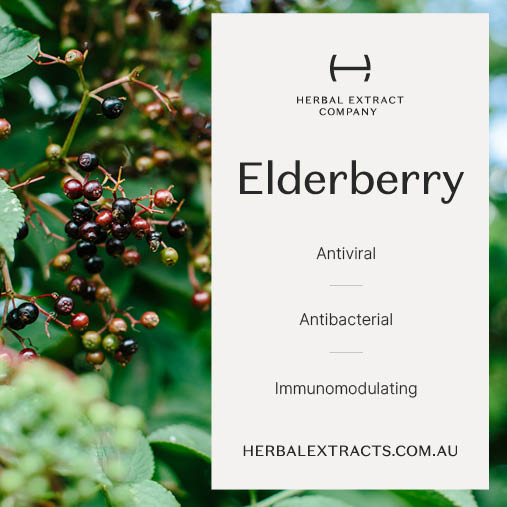Volume 35 Issue 3
Editorial
Susan Arentz
For referencing Arentz S. Editorial. The Australian Journal of Herbal and Naturopathic Medicine 2023;35(3):104-106
DOI https://doi.org/10.33235/ajhnm.35.3.104-106
Naturopathic and herbal healthcare: unveiling the essence beyond algorithms
In the pursuit of population health, the prevailing interventions have fallen short of their intended impact1. As we stand at the crossroads of innovation, the undeniable promise of artificial intelligence (AI) emerges as a potent force to address these shortcomings. AI’s unparalleled efficiency and precision are poised to bridge crucial gaps within human healthcare. Technological enhancement of the human health worker, from upskilling the workforce, bringing in non-human providers, to biological enhancement through wearing and inserting machines in human bodies, is firmly positioned on the table2–4. As the landscape evolves, health professionals, including naturopaths and herbalists, must embark on radical adaptations while remaining engaged, ushering in an era of transformative change.
AI’s ascent in healthcare is inevitable. Its capacity to decipher vast data, analytically predict and yield insights that humans struggle to unveil is an innovation that will address perplexing health problems, including worsening population health status. With an inherent capacity to integrate diverse information as conditions unfold, real-looking robots that mimic humans are able to provide person-centred care that is attentive and caring2. We saw this in the pandemic with humanoid nurse Grace tirelessly administering round-the-clock care, providing evidence-based medicine and indispensable solace to isolated people as well as a barrier to viral infection4. AI’s transformative capabilities, with a capacity to elevate healthcare to unprecedented levels, is staggering.

Meet Grace: the healthcare humanoid that COVID‑19 created (Hanson Robotics
and Awakenings in Health, image courtesy of CNN)
Calls to push ‘pause’ are apparent5. Emerging technologies are not only set to transform healthcare, they will also change what it means to be human. In a utopian world with AI, humans are pitched to experience a deep sense of enlightenment and enhanced cognitive capacities that transcend the current notions of human intelligence6. But there is strong reason for caution. Data is the new currency, and information is power and many set changes are irreversible5,6. Now is the time to think critically, reflect and engage. In leveraging all strengths, one of the main tasks at hand is to articulate what it is to be human.
The distinctions between humans and AI humanoids are rooted in their origins of existence, the nature of cognition, and their subjective experiences. Humans are differentiated as evolving, complex biological systems, with emotional depth, creative intuition, and a capacity for empathy. With intricate physiology, humans can experience a wide range of sensations, emotions and perceptions, while their consciousness gives rise to self-awareness and the ability to ponder and make meaning of abstract concepts. On the other hand, AI humanoids represent the synthesis of advanced technology and human ingenuity. Crafted with precision and guided by algorithms, humanoids possess cognitive capacities that mirror human intelligence. Their thought processes are meticulously programmed, and they exhibit intellectual dexterity and operational efficiency (Table 1).
Table 1. The difference between humans and humanoids (adapted from 7)
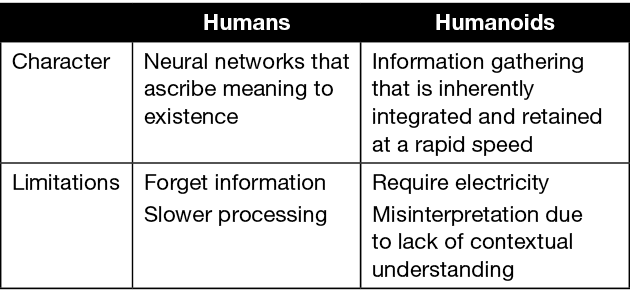
In this pause to reflect, many health disciplines wonder what they can bring to the collective intelligence and the new healthcare interface8. In many cases, health disciplines grounded in humanistic approaches remain tightly woven into the digital revolution’s fabric, a movement with aspirations to surpass the mechanistic medicine of last century9. Being entangled in this discourse will inevitably lead to Nurse Grace with a plug-in naturopath and herbalist that, according to protocol, performs iridology and prescribes natural medicines. Naturopaths and herbalists as a collective will gain more ground by upholding their distinctive complexities of practice. They stand apart from other health disciplines with a holistic philosophy, salute to vitality and healing as growth10 which demarks the differences between actual, true healing and health management of disease. The tenants of practice, such as mind, body, spirit oneness, interlinked energy and inner growth not only encompass all aspects of human wellbeing, but echo what it is to be human. Threaded through every facet of naturopathic and herbal care is a deep, soothing salve for the frenetic anxiety stirred by this transformative shift.
As AI advances in healthcare, it offers the potential to augment better health outcomes by addressing gaps beyond human capacity. At the core of health disciplines, foundations of knowledge must evolve to safeguard ethical governance and uphold the values intrinsic to human health practices as well as adapt health professionals identities5. In a positive model, a collaborative approach is proposed to enrich humans and healthcare. As barriers dissolve and personhood is redefined, naturopaths and herbalists could find themselves as one of the most needed, precisely because of their holistic and vitalism philosophy.
To mark the colour that spring season brings, we have complemented this issue with plenty of pictures. The NHAA organised Naturopathic Symposium was an outstanding success as Naturopaths and Herbalists were keen to network, receive recognition, hear answers to questions and find out about the latest developments and goings on. The following pages include photos of the spectacular in-person event.

Viewing the latest products
More pictures are included in response to the welcome critique from the symposium, that the journal would be of greater interest to the profession with a more colour. To this end we have invited the authors of manuscripts to include pictures that situate their research in the real world in which they inhabit. Researchers tell a human story that contributes a specific type of knowledge and builds on the overall body our professions and evidence for our practices. This type of knowledge is important as a demonstration of transparency and open to critique which are crucial elements needed for setting ethical standards and for advocacy of naturopathy and herbal medicine as the healthcare professions in their own right.

Natalie Cook, Rhiannon Hardingham, Sandra Villela,
Vicki van der Meer, Rachel Arthur, Sage King
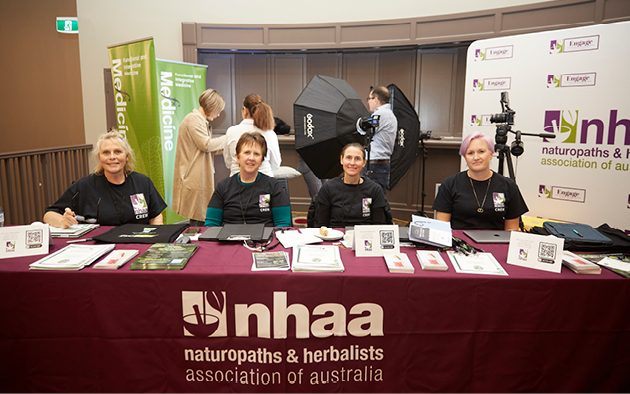
Members of the NHAA organising team
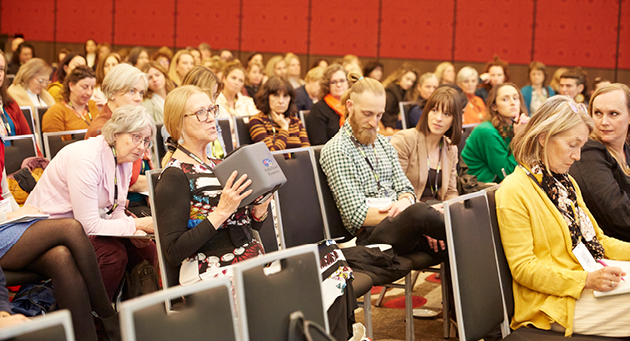
Questions were answered
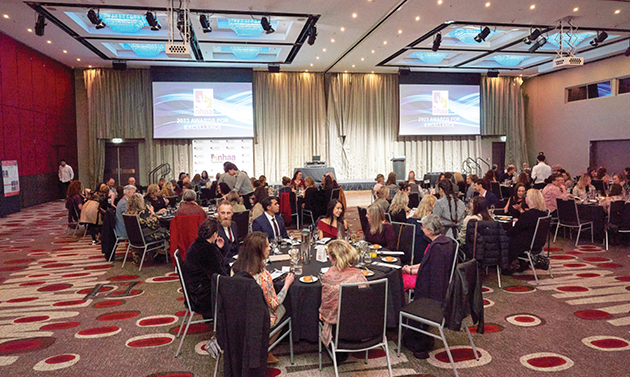
Gala Dinner

More of the organising team
Author(s)
Susan Arentz PhD, BHSc(Hons)
Editor, Australian Journal of Herbal and Naturopathic Medicine
PO Box 696, Ashfield, NSW 2131, Australia
Email editor.ajhnm@nhaa.org.au
References
- Australian Institute of Health and Welfare. Australia’s burden of disease study 2022. AIHW; 2022. Available from: https://www.aihw.gov.au/getmedia/d9ae4bfa-df27-4e3c-9846-ba452bef6ac5/aihw-bod-37.pdf.aspx?inline=true
- Neerincx MA, Van Vught W, Blanson Henkemans O, et al. Socio-cognitive engineering of a robotic partner for child’s diabetes self-management. Frontiers in Robotics and AI 2019;6:118.
- Revano TF, Garcia MB. iVital: a mobile health expert system with a wearable vital sign analyzer. 2021 IEEE 13th International Conference on Humanoid, Nanotechnology, Information Technology, Communication and Control, Environment, and Management (HNICEM); 2021: IEEE. p. 1–5.
- Getson C, Nejat G. Socially assistive robots helping older adults through the pandemic and life after COVID‑19. Robotics 2021;10:106.
- Johnson EA, Dudding KM, Carrington JM. When to err is inhuman: an examination of the influence of artificial intelligence‐driven nursing care on patient safety. Nursing Inquiry 2023:e12583.
- Porter A. Bioethics and transhumanism. Journal of Medicine and Philosophy 2017;42:237–60.
- Johnson EA, Dudding KM, Carrington JM. When to err is inhuman: an examination of the influence of artificial intelligence-driven nursing care on patient safety. Nursing Inquiry 2023.
- Zrínyi M, Pakai A, Lampek K, et al. Nurse preferences of caring robots: a conjoint experiment to explore most valued robot features. Nursing Open 2023;10:99–104.
- Gilligan MC, Osterberg LG, Rider EA, et al. Views of institutional leaders on maintaining humanism in today’s practice. Patient Education and Counseling 2019;102:1911–6.
- Soh N, Stathis S, Fodero L. Whole system, multi-modal or single modal interventions delivered in the context of naturopathic practice, for preventing and treating health conditions: research protocol. Canberra: NHMRC; 2021. doi:10.1111/nin.12583




